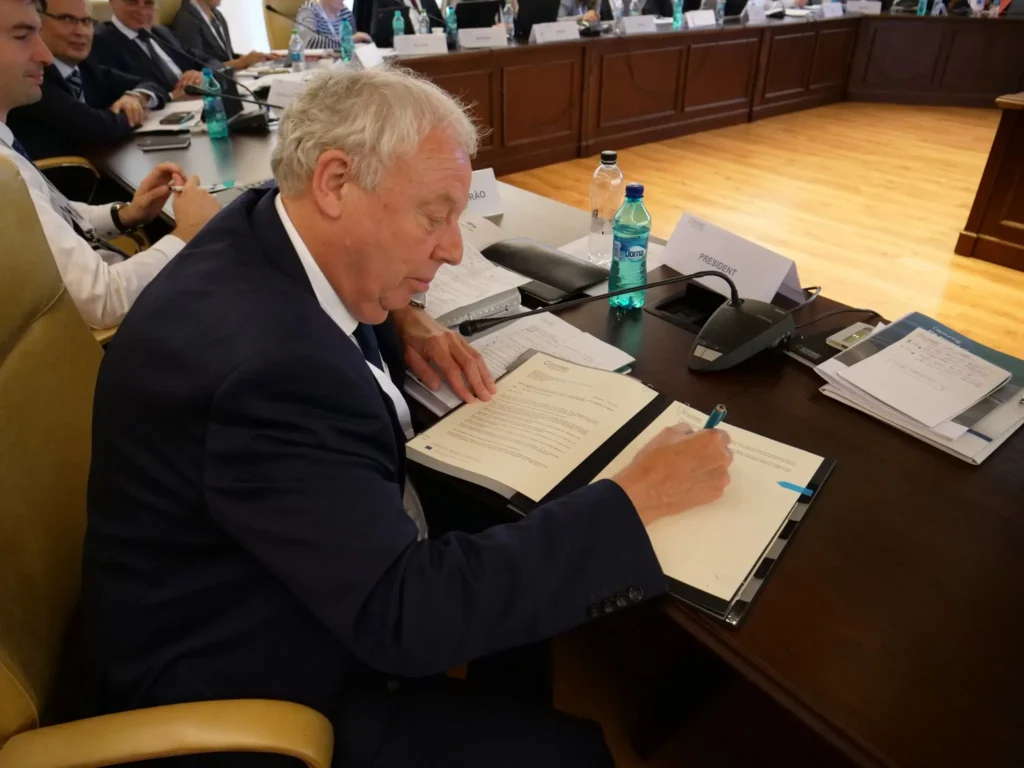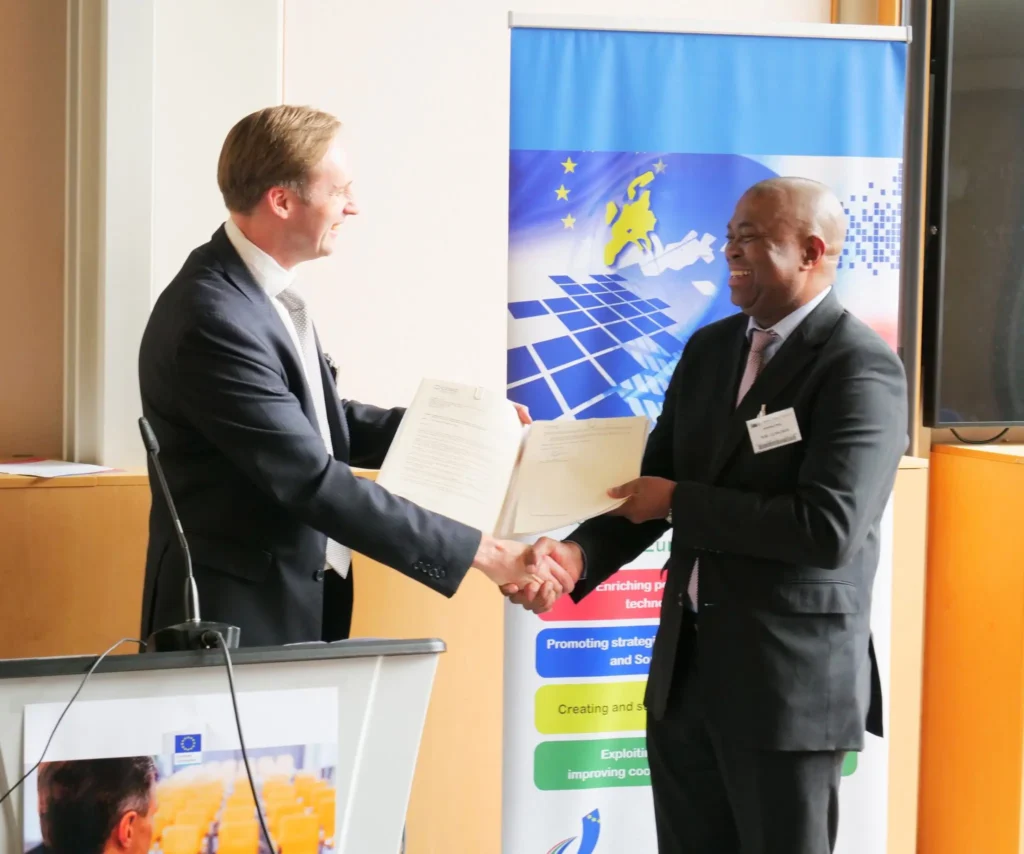Networks are the backbone of scientific progress, but creating and sustaining networks is challenging and requires the right platforms. COST provides networking opportunities for researchers and innovators to address scientific, technological, and societal challenges. But one thing we recognise is that successful networking and collaboration should not be limited by borders or regions.
Accordingly, back in 2019, the COST Association and South Africa reached an agreement on the status of COST Partner Member. This decision was made following the approval of South Africa’s application by the Committee of Senior Officials (CSO), COST’s General Assembly, at its meeting in Bucharest on 10-11 April 2019. South Africa is the first country to become a COST Partner Member.


The collaboration with COST has enabled South African researchers to participate in ongoing COST Actions networks and to be involved as secondary proposers in the annual Open Call for new COST Action proposals.
Dr Ronald de Bruin, Director of the COST Association, and Dr Phil Mjwara, former Director-General of the South African Department of Science and Innovation, reflect on five years of collaboration:

“COST provides a valuable platform for South African researchers and innovators to successfully collaborate with their European counterparts. We are proud to enable these excellent communities to meet, work, exchange ideas, create and advance science for the benefit of all.”
Dr Ronald De Bruin, Director of COST Association
“South Africa’s researchers and innovators are keen to find partners from Europe. We are pleased that the COST Partner Member status has strengthened the engagement of our research and innovation communities with European partners through COST Actions. This lays the foundations for continued cooperation beyond the lifetime of the Actions.”
Dr Phil Mjwara, Director-General of the South African Department of Science and Innovation

There are currently 52 ongoing COST Actions involving at least one of 80 South African participants. The topics they address ranges from public health to green transition, innovation and technology, and capacity building. Over the last five years there has also been a significant increase in collaboration during the preparation of proposals for the COST Open Call: from 21 proposals prepared with 23 South African proposers in 2019 to 52 proposals involving 70 proposers in 2023. The collaboration with COST has also provided South African researchers and innovators with a pathway to other funding schemes in the ERA.
What does the South African research community have to say?

Prof. Marena Manley from Stellenbosch University is a member of the COST Action ‘European Network for assuring food integrity using non-destructive spectral sensors‘ (SensorFINT). She commented on the impact of networking in COST Action by saying “The most useful element of my COST Action is the annual intentional conferences. These conferences give opportunities for young researchers from South Africa to rub shoulders with renowned researchers in the field. The SensorFINT COST Action currently has over 200 partners and the international conferences is attended by more than 100 people. Here, they typically give young scientists the opportunity to do oral presentations. This results in them receiving valuable feedback from established researchers. My postgraduate students who attended are now regularly communicating with internationally recognised researchers. They also benefit from Training Schools as well as Short-Term Scientific Missions (STSMs), as did I. Additionally, as South Africa is a COST Partner Member, I may attend the management meetings as observer”.
Dr Sebastian Orth is a Post doctoral fellow in AgriScience in the Department of Food Science of Stellenbosch University and he also participated in the SensorFINT COST Action, a European network for assuring food integrity using non-destructive spectral sensors. His involvement included international conference attendance, Short-Term Scientific Missions in Italy and France, and participation in a Training School at the prestigious Institut national de la recherche agronomique (INRAE). He attributes his participation in this research network to increasing his international exposure and the ability to build life long friendships and networks, and adds “For me participation in the COST Action as a young researcher is vital to build my network with established researchers and to improve my skillset. Not only is it vital for networking, but through Short-Term Scientific Missions I have gained exposure to equipment and methods that are not specifically available for me at Stellenbosch University. For South Africa being a COST partner member, it is an ideal opportunity to strengthen the researcher potential within the African continent – and cement the countries position as the most research-intensive country in Africa”


Haly Holmes is a periodontist in the Department of Oral Medicine and Periodontology at the University of the Western Cape Dental Faculty in Cape Town and a member of the ‘INTercEption of oRal CancEr develoPmenT‘ (INTERCEPT) COST Action. She explains “I share leadership of Working Group 3 in this COST Action along with Daniela Costea, a pathologist from the University of Bergen. We have more than 60 Working Group members from various parts of the globe with varied areas of expertise within different scientific specialities. COST Actions help to advance knowledge and strengthen research and development sector, by creating networking opportunities for researchers to meet and discuss ideas, complex problems can be addressed in a targeted way, across a large geographical area. Participants can share ideas and learn from each other and build capacity. For me, COST stands for: Commitment to Connecting people and Create Opportunities which are Sustainable and can Translate into meaningful outcomes.”
Prof. Albert Lysko is a Principal Researcher at the Council for Scientific and Industrial Research (CSIR) and Adjunct Professor at the University of Cape Town. He was first involved in a COST Action back in 2011 when he joined the ‘Versatile, Integrated, and Signal-aware Technologies for Antennas‘ (VISTA) COST Action and has since gone on to participate in a further three of COST’s research networks: IRACON, INTERACT, and SyMat. Commenting on his experience Prof. Lysko added “I have participated in several COST Actions. This enabled me to interact with a number of leading researchers in my field, to show what South Africa can offers and where it leads. COST also allowed me to attend several state-of-the-art PhD level courses and sharpen my skills, as well as to take my mentees to the meetings with the leading researchers and provide them with access to the training. Last but not the least, I also used what I learned in COST to organise a local training course in South Africa, with expert trainers. COST truly rocks!”

Are you a researcher or innovator from South Africa interested in participating in a COST Action network? Discover more on the COST Seed Funding provided by The Department of Science and Innovation (DSI) to support travel costs here.
